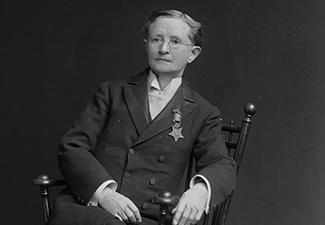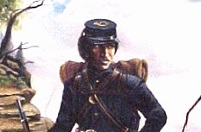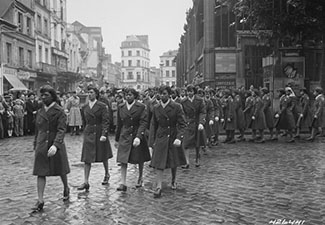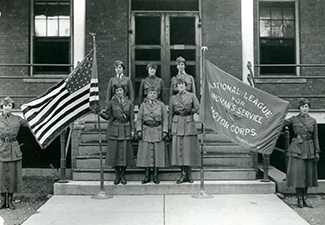Hopi Hero, Lori Ann Piestewa: The First Native American Female Lost in Combat

Lori Ann Piestewa enlisted in the Army in 2001 as a single mom, raising a 4-year-old boy and a 3-year-old girl. She was the daughter of a Vietnam veteran and the granddaughter of a World War II veteran. Serving her country was her calling – she even served as a commanding officer of Junior ROTC in high school.
But in March 2003, at just 23 years old, Lori made the ultimate sacrifice in Iraq when a rocket-propelled grenade hit her Humvee during an ambush. She became the first female service member to die in Iraq and the first Native-American female service member to die in combat.
Breaking Through the Glass Ceiling
When Lori deployed to Iraq, women comprised just 11% of the U.S. military. The war in Iraq was one of the first to truly test the “Risk Rule,” which prohibited women in units at risk of entering combat. Lori, however, was never supposed to be at risk in her role. She served in the 507th Maintenance Company, a support unit that transported water, supplies, and other non-combative help to combat units.
When her convoy took a wrong turn and was ambushed, Lori and others in her convoy, including her best friend, Jessica Lynch, were taken prisoner. While Lori ultimately lost her life due to her injuries, those taken prisoner were rescued a month later.

Lori Piestewa with friend and fellow soldier Jessica Lynch and Lori's son. Lori died following an ambush of their convoy in Iraq, and Jessica was captured and held as a prisoner of war.
Lori’s sacrifice for the nation made historic waves. She was honored with a Purple Heart and a mountain in her home state was later named in her honor.
Warriors like Lori paved the way for other women to wear the uniform and serve in combat roles, which wasn’t possible just a short time ago. Today, the rules have changed, and women are climbing the ranks.
“Seeing how she has made a lasting impact on women in the military is monumental. It reflects the strength of her character—one I often heard about, especially when she would challenge men to competitions during her time in Junior ROTC, proving that being a woman didn’t limit her abilities or achievements,” said Lori’s son, Brandon Piestewa.
“Putting this into perspective highlights the significance of my mother’s service to our country, a legacy that has not gone unnoticed… My mother’s example has inspired many women who have followed in her footsteps, serving their country with the same courage and determination that she embodied.”
In 2013, Defense Secretary Leon Panetta lifted the Pentagon’s 1994 ban on women in direct ground combat roles. However, it wasn’t until 2016 that women were eligible for all combat roles within the Army’s Combat Arms branch. In 2022, nearly 7,000 women were working in the branch. That meant more than 4% of the branch were women.
Today, women are the fastest-growing segment of the veteran population, with more than 3 million women having served throughout American history. Wounded Warrior Project® (WWP) created the Women Warriors Initiative to support the needs shared by wounded women warriors through research and conversation – more than 34,000 women warriors have registered with WWP.
Honoring Her Hopi Roots

Lori Piestewa holds her young son, Brandon. Lori joined the Army in 2001 and was killed in Iraq in 2003 at just 23 years old.
The Hopi tribe is known for peace. For Lori, picking up her fellow service members and leading them to safety was instilled in her from a young age, said her mother, Percy Piestewa.
“We feel that Lori’s purpose on this earth was to bring people together in peace and unity,” Percy said. “And if you look at … all of the people that she’s touched, that is her legacy.”
Her family and tribe did a prayer vigil for her while she was missing every single day at 6 p.m. This happened at daybreak in Iraq, so the prayers aimed to help those missing find their way home. Today, her legacy continues through traditions and memories upheld by her tribe and family.
“We hold two events every year, at least,” said Brandon Piestewa. “One is the memorial we hold every year for my mother and her comrades, but along with that memorial, we say it’s just for everyone to come together and heal. That’s March 23 every year.”
In addition, athletes from around the country compete in different sports, ranging from basketball to powerlifting, during the annual Lori Piestewa Native American Games over the summer.
Learn more about the legacy of Lori Piestewa directly from her son Brandon.
Lori’s Legacy Lives On
At first, Brandon Piestewa chose not to take on his mother’s last name. He wanted his own legacy.
“As a child, I had to mature faster than many of my peers, which brought both challenges and rewards. I chose to keep the last name ‘Whiterock’ to distinguish myself from the image of the popular kid whose mother had a mountain in Phoenix named after her…” he said. “While I love my mother and cherish the legacy she left behind, the publicity surrounding her was overwhelming for me as a child. Keeping my father’s last name allowed me to create my own identity.”

Lori Piestewa has left a lasting legacy through her children and within the Native American community she proudly represented.
While he sought to make his mother proud by excelling in school, building a positive reputation, and making a name for himself on the football field, he wanted to do so without the attention that followed the Piestewa name. But in March 2024, Brandon realized that he had made a name for himself in his community, and he officially changed his name to Brandon Piestewa.
“When the community eventually learned of my family connection, it was a humbling experience to see that I had forged an identity that would honor my mother’s legacy,” he said.
Not only does Brandon carry the name with him to make his own difference in the world, but others have, too.
In 2003, just after Lori’s death, motorcycle riders began a new tradition in her name. What started with about 20 riders visiting Lori’s family to offer support has turned into an annual tradition of hundreds of bikers, known as the Navajo-Hopi Honor Riders, riding 400 miles to honor families who lost their loved ones in combat.
In 2008, Squaw Peak, a mountain in Phoenix, was officially renamed after Lori Piestewa, as was a freeway near the mountain. Now known as Piestewa Peak, the prominent desert mountain honors Lori’s sacrifice for her nation while also acknowledging her roots and upbringing in Tuba City on the Navajo Reservation in Arizona.
The mountain's new name represents all those who died in combat. It sits in the middle of the city, with a summit at over 2,600 feet, making it a perfect destination for hiking, mountain biking, and horseback riding alongside its adjacent Freedom Loop Trail. As the second-highest point in the Phoenix mountains and the third-highest in Phoenix, the peak has become a symbol of patriotic Native American sacrifice.
The Piestewa name has become synonymous with honor, courage, and bravery.
“It is our hope that her story continues to inspire others, particularly in remembering the countless individuals who have selflessly put their lives on the line for the safety and freedom of this nation. Moreover, we aspire to encourage young people to take pride in their cultural heritage and origins, as these are integral parts of their identity and strength. This pride fosters resilience and unity within the Native American community,” said Brandon.
“Most importantly, the events held in my mother’s honor serve as vital spaces for healing. They are not merely commemorative, but places where individuals, particularly those who have faced similar hardships, can gather in unity,” added Brandon. “These events allow people to heal collectively, sharing their experiences and finding solace among others who understand their journey. In this way, we hope to provide a path for overcoming the trauma and challenges that many veterans and their families face, helping to build stronger, more connected communities.”
Contact: Kaitlyn McCue, Public Relations, kmccue@woundedwarriorproject.org, 904.870.1964
About Wounded Warrior Project
Since 2003, Wounded Warrior Project® (WWP) has been meeting the growing needs of warriors, their families, and caregivers — helping them achieve their highest ambition. Learn more about Wounded Warrior Project.



